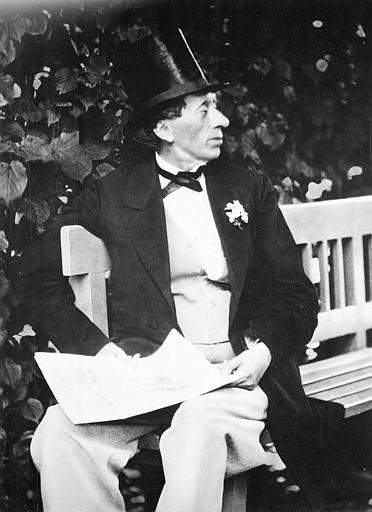 His closest confidante, Henriette Wulff, sent him a letter on November 18 to try to cheer him up. "You have discovered that you are that prince's child we talked about the other day," she wrote, "and you are feeling it too much! But I wish you wouldn't, because if you were descended from all the world's kings, I could not be any more fond of you."
His closest confidante, Henriette Wulff, sent him a letter on November 18 to try to cheer him up. "You have discovered that you are that prince's child we talked about the other day," she wrote, "and you are feeling it too much! But I wish you wouldn't, because if you were descended from all the world's kings, I could not be any more fond of you.""You have discovered that you are that prince's child . . ." What does she mean? Was it a private joke, or a reference to a story? Or an inexplicable aberration, like the time in 1830 when Bishop Blok wrote to Andersen as "Your Majesty?" The whole world knows that Hans Christian Andersen was the son of a poor shoemaker and a washerwoman, who through his own efforts and the kindness of strangers raised himself from the gutter to become a great poet.
Andersen himself called this rags-to-riches story "the fairytale of my life." But fairytale characters are not always what they seem. At the end of Adam Oehlenschlager's play Aladdin, a favorite of Andersen's, it turns out that Aladdin is not the son of a poor tailor, but instead the son of an emir. Andersen's childish imagination cast himself in the same scenario; he was, he told his first schoolfriend, a switched child of noble birth.
It is not an uncommon fantasy; just the sort of thing to expect from a solitary and dreamy boy such as Hans Christian Andersen. But in Andersen's case it is just possible that behind the consoling fantasy lies the naked truth.
Rumours about Andersen's true parentage have swirled around Denmark for a century or more. The most persistent, championed in books published there by Jens Jørgensen and Rolf Dorset, is that he was the illegitimate son of Countess Elise Ahlefeldt-Laurvig by Crown Prince Christian Frederik, the future King Christian VIII. If true, it was not just Andersen's king who died that January, but also his father...
The rest of the story is here
Everything you ever wanted to know (and more) about HCA is here
No comments:
Post a Comment